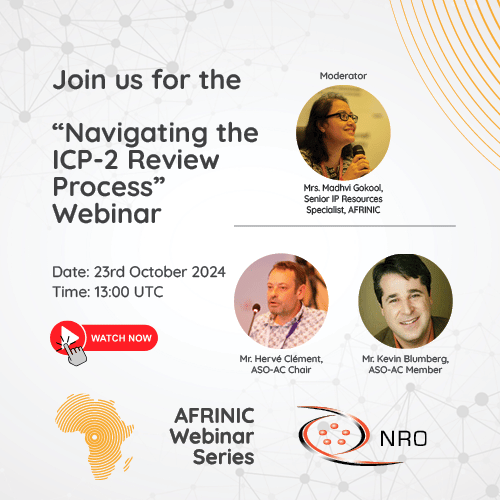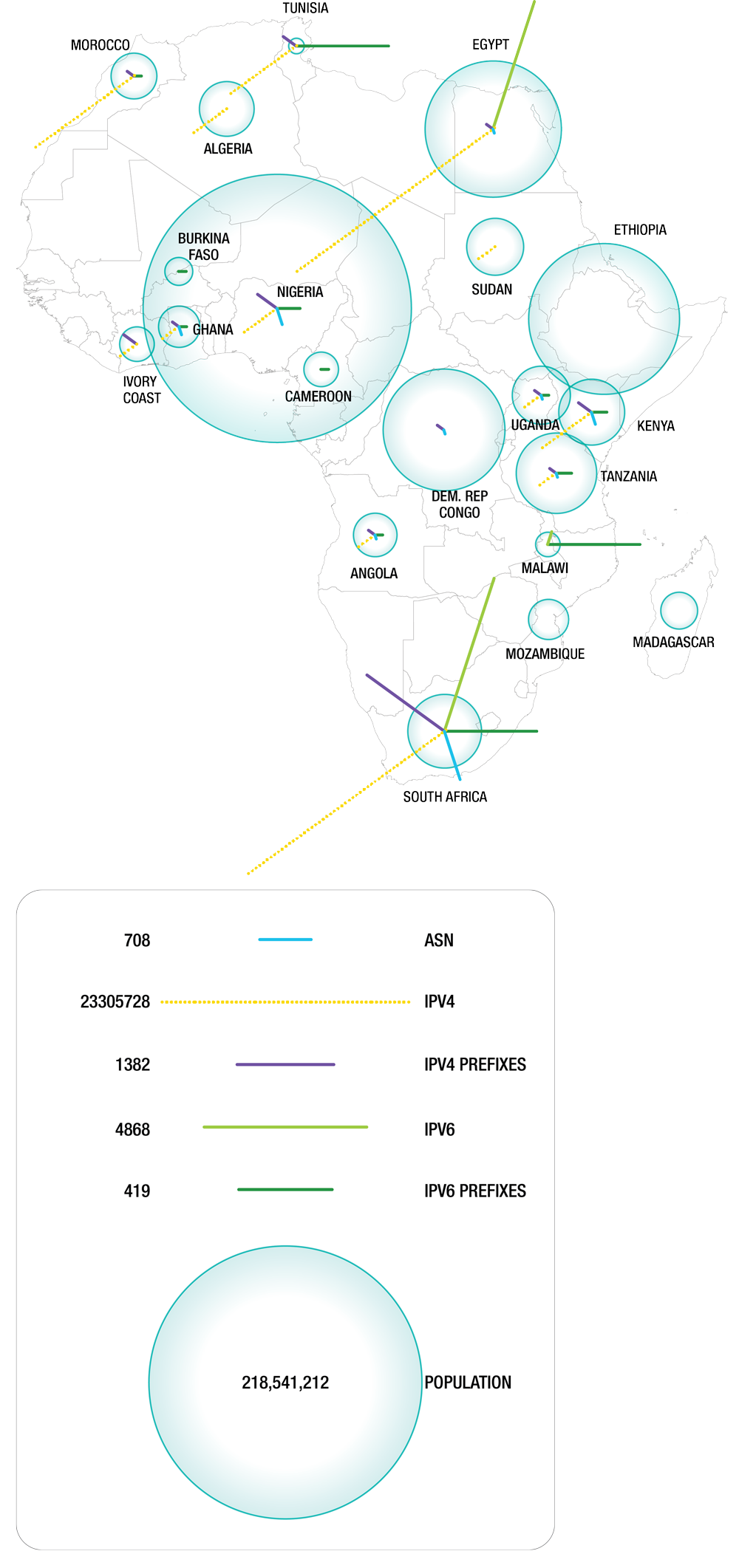IP Address and ASN Allocations in Africa: Unveiling Key Insights

In today's interconnected world, the Internet has become an integral part of our daily lives. From government services to education, healthcare to agriculture, and the financial sector, the Internet plays a crucial role in supporting various sectors and activities. At the core of this digital landscape lies the effective management and allocation of critical Internet number resources, such as IP addresses (IPv4, IPv6) and ASNs (Autonomous System Numbers). In Africa, these resources are managed by AFRINIC, the African Regional Internet Registry. In this blog, we will explore the importance of IP allocation statistics for Africa, some existing challenges, and the future implications for the continent.
Internet Number Resources Distribution in Africa
A Regional Internet Registry's primary function is to manage and distribute critical Internet number resources; IP addresses and ASNs within a service region.
The current system of managing Internet address space involves 5 Regional Internet Registries (RIRs), which share a global responsibility with the Internet Assigned Numbers Authority (IANA), a function of the Internet Corporation for Assigned Names and Numbers (ICANN). IANA functions are administrative tasks critical to ensuring the international coordination of IP addressing, domain names, and protocol parameter identifiers that are used by Internet standards. The IANA functions are performed by Public Technical Identifiers (PTI) under contracts and sub-contracts with ICANN.
IP number resources are finite and IPv4 is even more limited with under 1.2 Billion usable addresses globally. The evergrowing Internet has increased the demand for IPv4 addresses making it a scarce resource. The share of IPv4 addresses allocated to Africa is less than 6% of the global resources. AFRINIC allocates and assigns these Internet resources to organisations on a justifiable needs basis in line with the regional resource management policies. Since the beginning of our operations, we have allocated over 115 million IPv4 addresses to resource member organisations, mostly Internet Service Providers, governments, universities, start-ups and other organisations.
Across the African economies, Egypt tops the list for most IPv4 allocations closely followed by South Africa which, however, leads with most IPv6 allocations and is closely followed by Egypt. When it comes to ASN assignments, South Africa has received the highest number followed by Nigeria (Table 1).
Below is an insight into the IP address and ASN delegations made per region and per capita in Africa (Table 2).
The statistics show that the Northern African region has received the highest IPv4 allocations while the Indian Ocean region has the best ratio for IPv4 allocations per capita (2.6:1). The highest IPv6 allocation has been distributed in the Southern African region as shown in Table 2.
On the other side of the spectrum, the Central African region has received the lowest IPv4 resource allocation and has the least favourable ratio for IPv4 allocations per capita. Some of these statistics raise concern when we analyse the population size versus Internet resource allocation specifically zooming into many countries in the Central, Western and Eastern Africa regions.
Table 2. Internet Number Resource Allocation in Africa
Region | Population | IPv4 | ASN | IPv6 | Ratio IPv4 Allocation versus population |
|---|---|---|---|---|---|
Northern Africa | 270,974,041 | 51,439,360 | 210 | 4192 | 5.3:1 |
Southern Africa | 187,922,561 | 28,000,512 | 931 | 5221 | 6.7:1 |
Eastern Africa | 329,844,874 | 9,386,240 | 352 | 152 | 35.1:1 |
Western Africa | 411,861,045 | 8,965,632 | 519 | 226 | 45.9:1 |
Central Africa | 155,948,855 | 1,404,160 | 106 | 61 | 111.1:1 |
Indian Ocean | 32,235,370 | 12,376,320 | 76 | 45 | 2.6:1 |
Those disparities are indeed a matter of concern, more so, in the era of global IPv4 exhaustion noting that AFRINIC has currently only 1.29 million IPv4 addresses left in its pool and the growing population in our region. This raises the question that a huge part of the population in Africa may be left behind in terms of connectivity.
Policies Governing IP Address and ASN Allocation
As mentioned earlier, resource allocation in the AFRINIC service region is made on a “needs” basis and is governed by well-defined policies developed by the Internet community. These policies ensure fair and efficient resource allocation. Let's take a closer look at how these policies are shaped.
AFRINIC's policies are developed through a bottom-up process involving the Internet community. They provide input and participate in policy discussions, ensuring a diverse range of perspectives are considered.
Policies are developed through open and transparent consultations and consensus-based decision-making processes.
Those guidelines are published in the AFRINIC Consolidated Policy Manual.
Looking Ahead
As Africa's population is projected to double by 2050, ensuring adequate distribution of resources becomes paramount for the AFRINIC community who needs to proactively address this challenge by implementing efficient resource management policies, exploring avenues for IPv6 adoption, and advocating for sustainable growth. However, the underlying challenge of IPv4 depletion remains in our region as more effort must be injected towards adopting IPv6. It is indeed also a matter of concern that IPv6 adoption in Africa is slower than in other regions of the world and is currently estimated only at 2.19%, according to the statistics here.
IP allocation is vital for Africa's digital transformation and progress. They enable individuals, businesses, and communities to access the Internet, fostering education, economic growth, and social development. AFRINIC's policies, stakeholder involvement, and capacity-building initiatives demonstrate the positive impact of Internet resource distribution on the continent. By embracing emerging technologies, ensuring resource adequacy, and promoting equitable distribution, Africa can harness the power of Internet number resources to build a connected and prosperous future. However, it becomes paramount for organisations and governments alike to make plans for IPv6 adoption as the foreseeable solution to the continued digital growth of Africa.
Over the past few years, AFRINIC has been a beacon of support for network operators in Africa, offering expert guidance and assistance through its IPv6 deployment initiatives.
The Deployathon program is delivered by AFRINIC experts either in face-to-face sessions or remotely, ensuring that the implementation of IPv6 or any other protocol is done following the best common practices of the industry. Our goal is to deliver expert guidance to operational engineers so they can collaborate with their peers from different networks to confidently implement IPv6, RPKI and other Internet technologies or services on their networks.
AFRINIC has so far helped organisations in 32 African countries achieve 377 deployment milestones, thanks to its innovative and effective programs.
If you're interested in learning more about AFRINIC's Deployment program, please feel free to visit http://bit.ly/6deployEN and express your interest or any challenges that you might face in the process of deployment on your network. A DO Engineer will get back to you promptly.
For more information and queries about Deployathon program, please contact: This email address is being protected from spambots. You need JavaScript enabled to view it.



